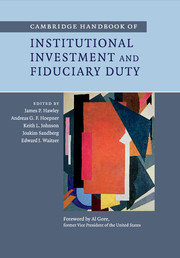Book contents
- Frontmatter
- Contents
- List of figures
- List of tables
- List of contributors
- Foreword
- 1 Introduction
- Part I Fiduciary duty: a global outlook
- Part II Fiduciary duty and the landscape of institutional investment
- Part III Challenging conventional wisdom on fiduciary duty
- Part IV Towards a broader interpretation of fiduciary duty
- Part V Beneficiaries’ roles and viewpoints
- Part VI Fiduciary duty and governance
- Index
- References
1 - Introduction
Published online by Cambridge University Press: 05 April 2014
- Frontmatter
- Contents
- List of figures
- List of tables
- List of contributors
- Foreword
- 1 Introduction
- Part I Fiduciary duty: a global outlook
- Part II Fiduciary duty and the landscape of institutional investment
- Part III Challenging conventional wisdom on fiduciary duty
- Part IV Towards a broader interpretation of fiduciary duty
- Part V Beneficiaries’ roles and viewpoints
- Part VI Fiduciary duty and governance
- Index
- References
Summary
Introduction
This Handbook responds to the evolution in the ownership of companies and financial assets over the past thirty to fifty years. It also is concerned with the more recent widespread failure of pensions and other long-term savings vehicles to deliver on sustainable financial security goals for the individuals whose monies they are investing.
The volume highlights important changes in the landscape of finance, especially with regard to institutional investors: those large financial institutions entrusted to manage most of our savings, pensions, retirement funds, insurance assets and national wealth reserves. It primarily focuses on the changing legal understanding of the role and purpose of these institutions in many countries. This includes recognition of the influence that collective investment practices of institutional investors have on society and the greater economy, as well as the corresponding influence that economic health and social stability have on the sustainability of institutional investors’ performance and their ability to succeed in meeting long-term goals for the beneficiaries who depend on them and who collectively constitute the societies in which they exist. The Handbook is also a testament to the rapidly evolving nature of academic research and public policy discourse concerning institutional investment and financial markets.
- Type
- Chapter
- Information
- Publisher: Cambridge University PressPrint publication year: 2014



